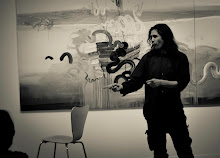It finally happened - I always wanted one - a Heckler: For how else do you know this is Stand Up? And that you are really getting to people? I love the idea that the audience have the right to answer back, and think it great that people felt happy enough to do so (and that the ideas were worth answering) - but it did raise a problem mid-performance of how I should respond. This problem was all the more tricky as there was only a limited time (around five minutes) for this piece. I could not then simply become Kant ad libbing an answer (which was my instinct), and had to stay inside the essay. My answer was (and you can see it in the performance below), was to engage the heckler, trying to bring him to the argument. But the question was how to do it? Taking my cue from Kant, I felt I had to be gentle - as arguing with Kant is tricky - he is very very good (although always polite), and if you are not used to him, likely to blast you away (as he has usually thought of the problem you are raising...). One has therefore to genuinely be listening to the argument, and note, as one keeps going on, the point which will really answer the heckle.
In this performance (and I hope you can see it), the answer to the heckler comes at the end - with Kant's masterful (but genuinely difficult) paradox - that in obeying, one is finally free. The point being that real freedom exists in thought alone, and in our human ability to argue and influence one another, and this true freedom is too often occluded or delimited by supposed freedoms 'to act'. Kant is therefore setting the two types of freedom - of 'action' and of 'thought' against each other, and arguing that one is worth protecting from the other. The heckle in the interest of the freedom to act is therefore very much caught within this paradox, and kind of illustrates Kant's point rather well... Which was of course why I was delighted.
My main worry was that it might be too much to ask an audience to take Kant on. I wanted not to be too aggressive in the reply, and to allow the audience to feel that they can answer, and can position themselves in relation to the argument, while all at the time same being true to Kant. A difficult balancing act - and if you want to see if it proved possible, the video is here.


No comments:
Post a Comment